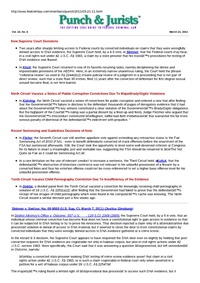Loaded on
March 21, 2011
published in Punch and Jurists
March 21, 2011
Here a divided panel vacated a conviction for knowingly receiving child pornography in violation of § 2252(a)(2) after finding that the Government had failed to prove that possession of two images of child pornography in a computer’s cache was knowing.
We recently noted a case in which the …
Loaded on
March 21, 2011
published in Punch and Jurists
March 21, 2011
Circuit Judge David Hamilton (who was appointed to the Seventh Circuit in 2009 by President Obama) was clearly not happy when a majority of the panel on which he was sitting routinely rubber stamped, on grounds that were patently pretextual in nature, an overly aggressive police frisk of a …
Loaded on
March 21, 2011
published in Punch and Jurists
March 21, 2011
In 2010, after some three decades of debate and controversy over the inherent unfairness of the Federal crack cocaine sentencing laws, Congress finally enacted the Fair Sentencing Act of 2010 (“FSA”). Its stated purpose was “to restore fairness to Federal cocaine sentencing.” Unfortunately, since its enactment into law on …
Loaded on
March 21, 2011
published in Punch and Jurists
March 21, 2011
Here the majority vacated a series of convictions for public corruption and ordered a new trial based on serious violations of the Government’s Brady/Giglio disclosure obligations; but Judge Fletcher dissented because the indictment was not also dismissed.
There probably are hundreds of motions filed each month by defense …
Loaded on
March 21, 2011
published in Punch and Jurists
March 21, 2011
Anytime a court limits the scope and reach of the ubiquitous and far-reaching tentacles of the Guidelines’ “relevant conduct” provisions, that is a noteworthy ruling. And that is precisely what the Third Circuit did in the instant case.
Relevant conduct, of course, is the controversial and novel sentencing weapon …
Here, in a narror ruing, the Court held, by a 6-3 vote, that the Federal courts may hear, in a civil rights suit under 42 U.S.C. § 1983, a claim by a state prisoner that his state’s procedures for testing of DNA evidence was flawed.
In District Attorney's …
In another of its seemingly endless series of dense and impenetrable decisions on the meaning of some of the equally dense and impenetrable provisions in the Antiterrorism and Effective Death Penalty Act of 1996 (“AEDPA”), the Supreme Court addressed in this case the meaning of the phrase “collateral review” …
